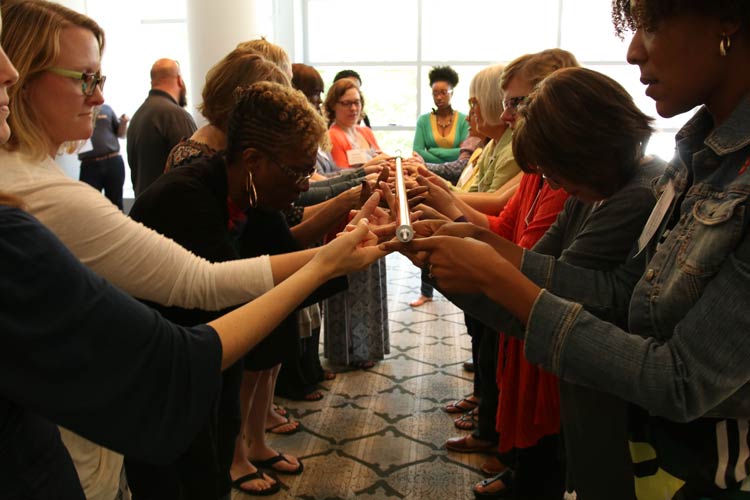Allison Williams serves as Wyman’s Senior Vice President of Programs. Williams recently spoke about the importance of social-emotional skills during Wyman’s annual Learning Exchange, which convened TOP partners from across the nation. The following is her reflection from those discussions.
—
I recently watched young people walk across the stage at several Wyman teen graduation ceremonies. During their speeches, teens reflected on the challenges – and growth – they experienced throughout high school.
They spoke about recognizing the sense of responsibility they have to addressing issues within their communities. They shared how they sparked change among their peers and served as change agents within their schools. They reflected on the power of teamwork and collaboration. Their stories demonstrated a deep sense of empathy and social awareness that extended beyond their individual needs. They recounted how the support and caring relationships they generated with adults helped them along the way.
One graduate’s story continues to replay in my mind. This young woman, in particular, surmounted incredible physical and emotional obstacles that would have personally stopped me in my tracks. With persistence, and the support of caring, knowledgeable adults around her, she graduated high school with honors and now has a clear college path ahead of her. She graciously shared a key learning with her classmates: “Developing my voice, sharing my story to help others, and learning how to be my authentic self through this program was priceless.”
This young woman’s social-emotional skills helped her get through trying times. At Wyman, we know that experiential, empowering, and engaging opportunities help young people build social-emotional skills. Our graduates shared that.
Emerging evidence continues to verify that adults play a critical role in the lives of teens that experience trauma. To help them develop the pathways in the brain to recover from such events, adults should work to establish authentic and meaningful relationships with young people. Whether they called them a coach, mentor, teacher, group leader, or facilitator, nearly every young person spoke about the power of a relationship and support from a key adult.
I walked away from these ceremonies humbled by the opportunities we have as youth practitioners to support the success of young people. I was also reminded about the profound responsibility we have to ensure our work with teens is consistently providing developmental experiences that create opportunities for growth. We must equip adults with the knowledge and skill set to do so.
In preparation for the coming school year, Wyman convened our partners from across the nation at our annual Learning Exchange to share strategies and best practices to support teens on their path to success.
Strategies for social-emotional learning, developed through Wyman’s recent participation in the Social Emotional Learning Challenge, were highlighted during the event. During those discussions, our partners walked away with several takeaways:
- As youth development professionals, there’s power in speaking the same language, and helping our teens do the same. Helping young people name their feelings and voice them helps adults recognize and respond appropriately.
- As youth practitioners, we have to reinforce to teens that making mistakes is okay – there are many lessons to be learned in failure, and the process of examining those lessons is powerful.
- In addition, we must model the same social-emotional skills we are seeking to help young people develop. Helping them through the trauma they experience can be incredibly emotional. Active listening and self-care is key.
Stay tuned in the coming months as we share the importance of social-emotional learning, its role within positive youth development, lessons learned from the Social Emotional Learning Challenge, and how youth serving professionals can improve their practice.
We look forward to supporting a movement to ensure all adults are equipped to support teens’ educational success, life and leadership skills, and healthy behaviors and relationships.


